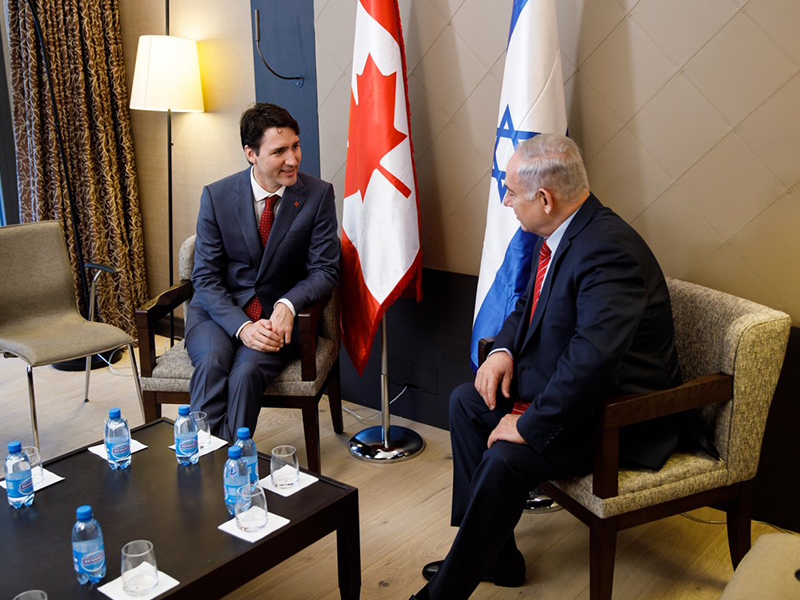Israeli Prime Minister Benjamin Netanyahu and Prime Minister Justin Trudeau met on the sidelines of the World Economic Forum in Davos, Switzerland, on Jan. 24.
The two leaders discussed updating the Canada-Israel Free Trade Agreement (CIFTA), which dates back to 1997, as well as the security situation in the Middle East and other economic ties between the two countries.
The encounter was part of a series of meetings that Trudeau had with several world leaders, including Argentinian President Mauricio Macri, German Chancellor Angela Merkel, Indian Prime Minister Narendra Modi and Italian Prime Minister Paolo Gentiloni.
Netanyahu also met with Belgian Prime Minister Charles Michel and Swiss President Alain Berset.
According Israeli Ministry of Foreign Affairs’ (MFA) website, “Prime Minister Netanyahu discussed the nuclear agreement with Iran and called on the leaders to utilize the opportunity that has been created in the wake of U.S. President Donald Trump’s declaration (to move the embassy from Tel Aviv to Jerusalem). He noted that he will not allow Iran to establish a military presence in Syria and added that Israel is working to prevent this.
READ: CANADA SIGNS NEW AIR TRANSPORT AGREEMENT WITH ISRAEL
“On the Palestinian issue, Prime Minister Netanyahu said that he will not compromise on Israel’s security needs in any future agreement.
“The prime minister presented the changes that are taking place in the Middle East and the opportunities that have been created. He expressed the desire to deepen economic and technological co-operation with Canada, Belgium and Switzerland.”
In Canada, Jewish organizations applauded the encounter between Trudeau and Netanyahu.
“The meeting between Prime Minister Trudeau and Prime Minister Netanyahu in Davos represents a welcome opportunity to reaffirm and strengthen the Canada-Israel relationship at the most senior level,” said Shimon Koffler, chief executive officer of the Centre for Israel and Jewish Affairs.
“These in-person conversations between the prime ministers are extremely valuable in ensuring progress in expanding bilateral ties, including current talks to update the Canada-Israel Free Trade Agreement. We have been monitoring those efforts closely and look forward to next steps stemming from the prime ministers’ meeting.”
These in-person conversations between the prime ministers are extremely valuable in ensuring progress in expanding bilateral ties.
– Shimon Koffler
“We are very pleased that Prime Minister Trudeau met with Prime Minister Netanyahu on updating the free trade agreement,” said Karen Mock, president of JSpace Canada.
“With Israel’s many outstanding products and technological innovations, we are delighted with the prospect of Canada and Israel increasing their commercial and trade relations and hopefully enhancing academic, scientific and research and development partnerships and collaborations.
“We hope that Trudeau also took the opportunity to discuss strategies to enhance the peace process, offering Canada’s assistance where deemed appropriate and helpful, as well as to address some key issues in which Canada can, and should, play a moral suasion role – such as changing the current approach to African asylum seekers, in keeping with Canadian and Jewish values on the humane and just treatment of refugees, and ceasing the expansion of settlements that continue to be an impediment to resuming the peace process.”
According to Global Affairs Canada, CIFTA was last updated, following former prime minister Stephen Harper’s visit to Israel in 2014.
“On July 21, 2015, Canada and Israel announced the conclusion of an expanded and modernized CIFTA, making it a 21st-century agreement by reducing technical barriers, enhancing co-operation, increasing transparency in regulatory matters and reducing transaction costs for businesses,” reads Global Affairs Canada’s website.
It also noted that, “Since the original agreement came into force, Canada’s two-way merchandise trade with Israel tripled to $1.6 billion in 2014,” up from $567 million in 1997.
